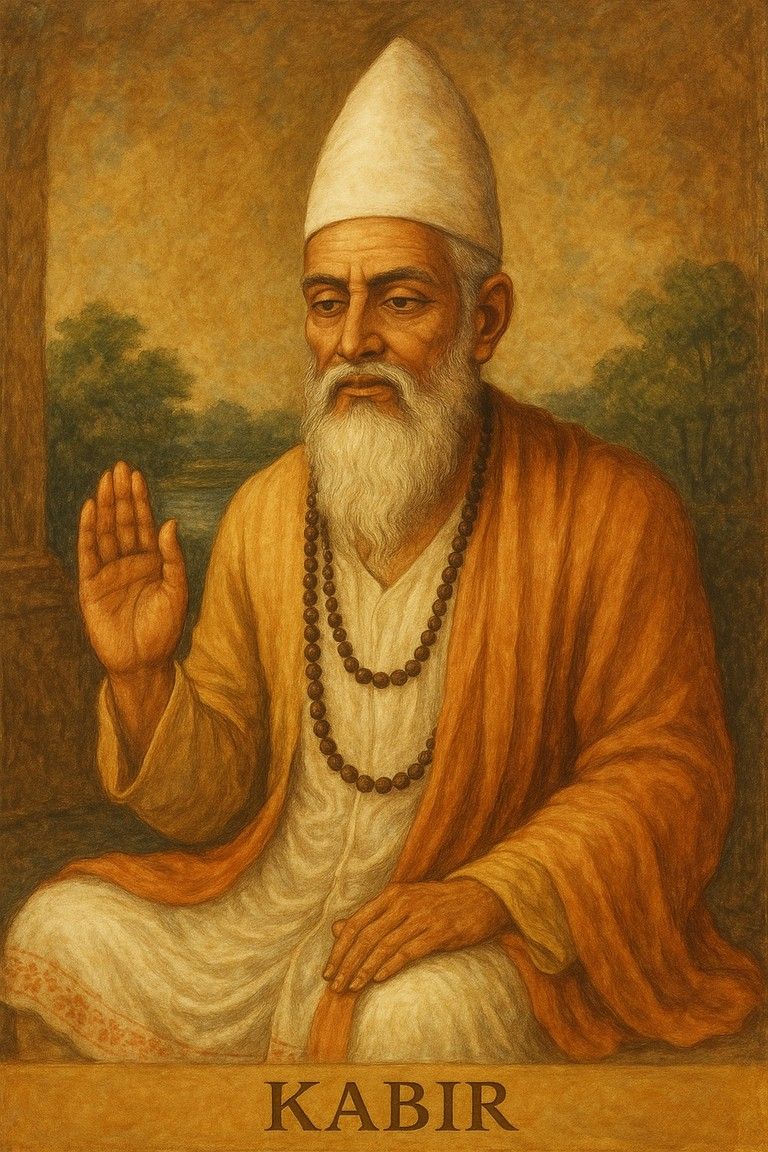




Early Life and Spiritual Journey of Kabir
Kabir is a legendary figure in Indian spiritual and literary history. Known for his profound poetry and teachings, he played a major role in bridging Hindu and Muslim beliefs during the 15th century. His life story continues to influence students, philosophers, and spiritual seekers across India and beyond.
In this article, we explore his early life, poetic journey, major achievements, and enduring legacy as a mystic poet and reformer.

Early Life of Kabir
Kabir was born around 1440 in Varanasi (present-day Uttar Pradesh, India). The exact details of his birth are uncertain, but he is widely believed to have been raised by a family of Muslim weavers named Neeru and Neema.
His early upbringing in a humble environment deeply influenced his outlook. Surrounded by both Hindu and Muslim cultures, Kabir developed respect for all religions but questioned blind rituals from an early age.
Career and Achievements
Kabir gained recognition through the following key contributions:
- Composing timeless dohas (couplets) and poems in vernacular Hindi that criticized social discrimination and religious orthodoxy
- Emerging as a leading figure of the Bhakti movement, promoting devotion and equality
- Influencing saints, poets, and reformers across generations and religions, including Sikhism and Sufism
Key Events in Kabir’s Life
| Year | Event | Significance |
|---|---|---|
| c. 1440 | Birth in Varanasi | Raised in a weaver family, exposed to Hindu-Muslim traditions |
| Late 1400s | Began composing poetry | Expressed spiritual and social ideas in simple language |
| c. 1518 | Death in Maghar, Uttar Pradesh | Left a lasting literary and philosophical legacy |
Personal Life and Public Image
Kabir was known for his fearless voice against social evils and his advocacy of truth, simplicity, and compassion. He is believed to have been married to Loi and had a son named Kamal, but he always prioritized spiritual values over material attachments.
Kabir’s personal life drew public attention as he refused to identify strictly with either Hinduism or Islam. Despite facing hostility, he continued to spread messages of love, unity, and the futility of religious divisions.
Legacy of Kabir
Kabir continues to influence others through:
- Promotion of religious harmony and social equality in India
- Inspiring the formation of the Kabir Panth, a community following his teachings
- His works being included in Sikh scripture (Guru Granth Sahib) and school syllabi
This biography highlighted the journey and influence of Kabir. His contributions remain relevant in literature, philosophy, and social reform even today.
Learn more about historical and modern-day personalities on Vedantu’s platform.
- Discover other spiritual leaders like Swami Vivekananda for comparative studies in Indian philosophy.
- Read about Akbar to understand the era of religious tolerance during Kabir’s time.
- Explore the life of another literary giant, Rabindranath Tagore.
- Dive into Asian spiritual figures with the Buddha biography.
- Learn about inspirational models of service with Mother Teresa.
- Compare world poets by reading the William Wordsworth biography.
- Study reformers like Mahatma Gandhi for lessons in unity and nonviolence.
- Discover women’s leadership in literature with Sarojini Naidu.
FAQs on Who is Kabir? Life and Achievements of the Indian Mystic Poet
1. Who is Kabir?
2. Why is Kabir famous?
3. What are Kabir’s teachings?
4. When did Kabir live?
5. What is the famous poem of Kabir?
6. Who was Kabir Das married to?
7. What religion did Kabir follow?
8. What is the biography of Kabir?
9. What is Kabir’s influence on Indian literature?
10. What are some of Kabir's famous quotes or dohas?
11. How did Kabir’s teachings influence the Bhakti movement?
12. What is the significance of Kabir's use of vernacular Hindi?





















